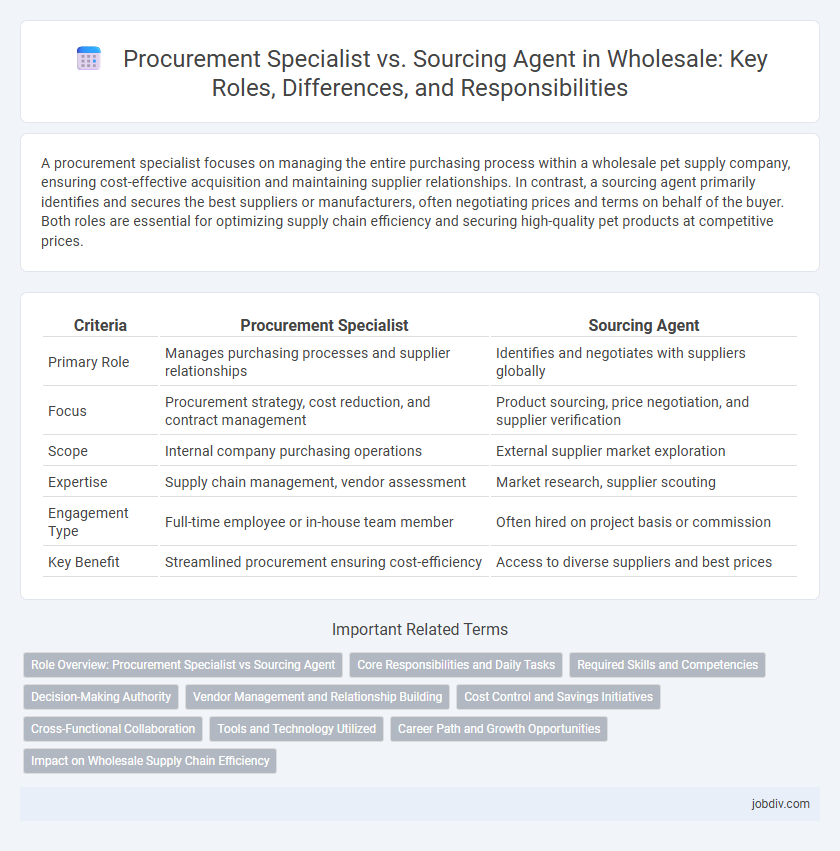A procurement specialist focuses on managing the entire purchasing process within a wholesale pet supply company, ensuring cost-effective acquisition and maintaining supplier relationships. In contrast, a sourcing agent primarily identifies and secures the best suppliers or manufacturers, often negotiating prices and terms on behalf of the buyer. Both roles are essential for optimizing supply chain efficiency and securing high-quality pet products at competitive prices.
Table of Comparison
| Criteria | Procurement Specialist | Sourcing Agent |
|---|---|---|
| Primary Role | Manages purchasing processes and supplier relationships | Identifies and negotiates with suppliers globally |
| Focus | Procurement strategy, cost reduction, and contract management | Product sourcing, price negotiation, and supplier verification |
| Scope | Internal company purchasing operations | External supplier market exploration |
| Expertise | Supply chain management, vendor assessment | Market research, supplier scouting |
| Engagement Type | Full-time employee or in-house team member | Often hired on project basis or commission |
| Key Benefit | Streamlined procurement ensuring cost-efficiency | Access to diverse suppliers and best prices |
Role Overview: Procurement Specialist vs Sourcing Agent
A Procurement Specialist manages the entire purchasing process, including supplier selection, contract negotiation, and inventory management to ensure cost-effective acquisition of goods and services. A Sourcing Agent focuses primarily on identifying and evaluating suppliers, conducting market research, and facilitating supplier relationships to secure optimal product quality and pricing. Both roles are essential in wholesale operations but differ in strategic scope, with Procurement Specialists overseeing broader supply chain activities and Sourcing Agents concentrating on supplier discovery and verification.
Core Responsibilities and Daily Tasks
Procurement specialists manage the entire purchasing process by evaluating suppliers, negotiating contracts, and ensuring timely delivery of goods, focusing on cost efficiency and quality compliance. Sourcing agents primarily identify and connect with potential suppliers, conduct market research, and facilitate communication between buyers and manufacturers to secure best-fit products. Daily tasks for procurement specialists include supplier performance analysis and purchase order management, while sourcing agents focus on supplier identification, sample evaluation, and market trend monitoring.
Required Skills and Competencies
Procurement specialists require strong analytical abilities, negotiation skills, and in-depth knowledge of supply chain management to assess vendor performance and ensure cost-effective purchasing decisions. Sourcing agents emphasize market research expertise, cultural competence, and relationship-building skills to identify reliable suppliers and navigate international trade complexities. Both roles demand proficiency in contract management, price evaluation, and compliance with regulatory standards to optimize procurement outcomes.
Decision-Making Authority
Procurement specialists possess higher decision-making authority as they manage supplier relationships, negotiate contracts, and oversee purchasing strategies within wholesale operations. Sourcing agents primarily execute supplier searches and recommend options but typically require approval from procurement specialists before finalizing purchases. Clear delineation in authority ensures efficient procurement workflows and compliance with company policies.
Vendor Management and Relationship Building
Procurement specialists focus on vendor management through formalized processes, contract negotiations, and compliance monitoring to ensure reliable supply chains and cost efficiency. Sourcing agents emphasize relationship building by leveraging personal networks and market insights to identify and secure quality suppliers, often facilitating better communication and customized solutions. Both roles contribute to optimizing vendor performance but differ in strategic approach and operational scope within wholesale procurement.
Cost Control and Savings Initiatives
Procurement specialists implement strategic cost control measures by analyzing supplier contracts and negotiating volume discounts to optimize wholesale expenses. Sourcing agents focus on identifying low-cost suppliers and leveraging competitive bidding to maximize savings for bulk purchasing. Both roles drive cost efficiency but procurement specialists prioritize long-term supplier relationships, while sourcing agents emphasize immediate price reductions.
Cross-Functional Collaboration
Procurement specialists excel in cross-functional collaboration by managing supplier relationships, negotiating contracts, and ensuring seamless integration between purchasing, finance, and operations teams to optimize supply chain efficiency. Sourcing agents focus on identifying and securing suppliers, often bridging cultural and language barriers to facilitate communication and coordination between manufacturers and buyers across different regions. Both roles require strong interpersonal skills and strategic alignment with internal departments to drive cost-effective procurement decisions and maintain supply continuity.
Tools and Technology Utilized
Procurement specialists leverage enterprise resource planning (ERP) systems and spend analysis software to optimize purchasing decisions and supplier management. Sourcing agents focus on digital marketplaces and supplier databases to identify competitive vendors and negotiate prices. Both roles utilize data analytics tools, but procurement specialists emphasize integration with internal workflows, while sourcing agents prioritize external market intelligence.
Career Path and Growth Opportunities
Procurement specialists often follow a structured career path within corporate supply chains, advancing to roles like Procurement Manager or Supply Chain Director by leveraging expertise in contract negotiation and supplier relationship management. Sourcing agents typically operate in more dynamic environments, gaining diverse experience through direct supplier interactions and project-based assignments, which can lead to roles in global sourcing management or independent consultancy. Growth opportunities for procurement specialists are generally tied to organizational hierarchy and skill specialization, while sourcing agents benefit from broader market exposure and entrepreneurial prospects.
Impact on Wholesale Supply Chain Efficiency
Procurement specialists streamline wholesale supply chain efficiency by managing supplier relationships, negotiating contracts, and ensuring consistent quality and timely delivery of bulk goods. Sourcing agents focus on identifying and vetting suppliers, often reducing costs and lead times through localized expertise and market insights. Their combined roles optimize inventory management, reduce disruptions, and enhance overall supply chain reliability in wholesale operations.
Procurement Specialist vs Sourcing Agent Infographic

 jobdiv.com
jobdiv.com